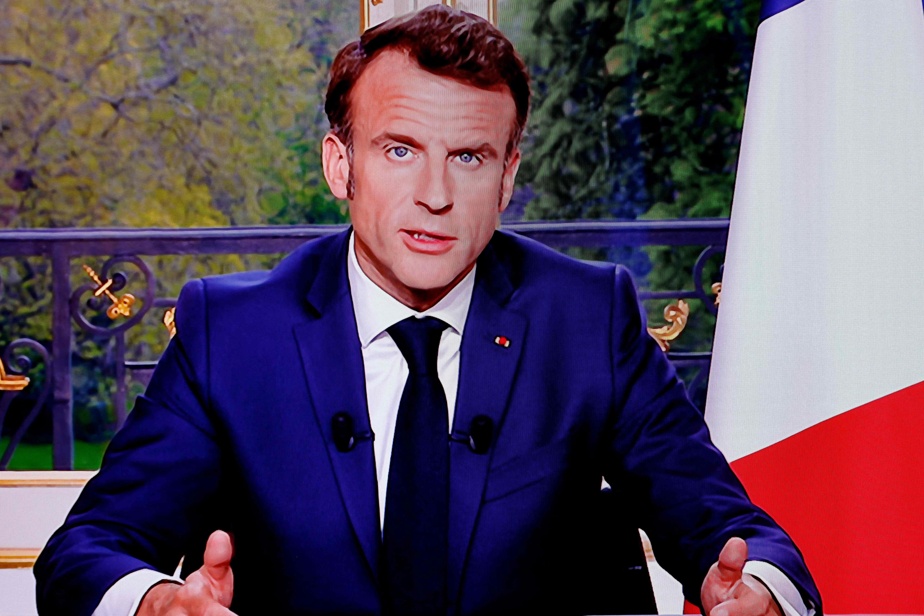(Paris) Emmanuel Macron gave himself Monday, in a televised address, “100 days” to act “in the service of France”, and thus relaunch his second five-year term mired in the crisis caused by his pension reform.
From his office at the Élysée, where he spent most of his time in a posture of withdrawal during these three months of social and political conflict, the Head of State spoke for 13 minutes to the French who reject massive retirement at 64, now enshrined in a law he signed into law at the start of the weekend despite protests from the unions.
The disputed reform was “necessary”, he pleaded, saying “regret” that it was not “accepted” and that a “consensus” could “not be found”.
Sitting at his desk in front of a window overlooking the gardens, he also claimed to hear the “anger” of the French. “No one can remain deaf to this demand for social justice and the renewal of our democratic life,” he said.
At the very moment of this solemn address and without opponents, pot concerts were organized in front of many town halls and prefectures, bringing together several thousand people.
But the President of the Republic, determined to regain the initiative since his law was generally validated on Friday by the Constitutional Council, has above all drawn up his “road map” for the future that his Prime Minister will have to detail “as of next week. “. While she appeared threatened for a month, Elisabeth Borne thus obtained a three-month reprieve.
No reshuffle is planned immediately, according to several sources in the presidential camp.
“We have before us 100 days of appeasement, unity, ambition and action in the service of France”, proclaimed Emmanuel Macron, giving an appointment “on July 14 next” to “take a first assessment “.
During this period, he set three projects, starting with the construction, with the social partners, of a “new pact for life at work”, the outlines of which remain to be defined.
But social dialogue promises to be strewn with pitfalls.
The Medef and the Confederation of SMEs have planned to go to a meeting at the Élysée Palace with Emmanuel Macron on Tuesday at 11 a.m., maintained even though it is shunned by the inter-union which calls for a “period of decency”.
“The door will always be open,” he told the unions.
“We can’t pass the towel”, launched Monday morning the secretary general of the CFDT, Laurent Berger, who regretted after the presidential intervention that there was “nothing concrete”.
The inter-union is betting on a show of force on May 1, after which the CFDT could however return to the negotiating table to discuss these other issues around work.
The second project concerns justice and “republican order”, with “strong announcements from May” against delinquency and social and tax fraud. Emmanuel Macron also promised to “strengthen the control of illegal immigration”, seeming to relaunch this project which seemed to be on hold.
Finally, the third project: “progress to live better”.
On the menu, education, which must “reconnect with the ambition of being one of the best in Europe”, and health, with the commitment to “unclog” all emergency services by the end 2024.
In the next few days, the president should come out of the Élysée to “discuss with the French”, according to his entourage. One or two trips are planned in the provinces from Wednesday or Thursday to talk about education in particular.
Apart from the Agricultural Show at the end of February, the Head of State has stayed away from crowds since the beginning of the year. Will he be able to renew this contact, while his last trips have been heckled by demonstrators?
“I ask that Macron spend more time on the ground”, including “within reach of the slaps”, pleads a minister.
For her part, Brigitte Macron, traveling in Val-d’Oise, assured that the presidential couple, despite the disputes and a “complicated period for the French”, was not “isolated”.
Forging the link will remain difficult. Presidential popularity is at its lowest since the “yellow vests” crisis at the end of 2018, and in his camp, it is hoped that he will once again manage to bounce back.
“The president is very, very unpopular. There is a lot of animosity towards him,” sighs an MP from his own party, Renaissance.
Relaunching the machine will be all the more complex as the executive emerges weakened from the sequence.
How to continue to reform, without an absolute majority in the National Assembly? Emmanuel Macron had entrusted Elisabeth Borne in March with the mission of widening the relative majority, but the head of government did not succeed.
On Monday evening, he evaded the question, referring to “new coalitions and alliances” with still vague outlines.
Unsurprisingly, the opposition immediately criticized the presidential speech.
On the far right, Marine Le Pen denounced a “disconnected, solitary and obtuse practice of power” after this speech which, according to her, announces “the continuation of a five-year term of contempt, indifference and brutality”. “Completely out of reality”, also estimated on the left Jean-Luc Mélenchon, while the boss of the Les Républicains party deplored a “catalogue of pious wishes” without “questioning”.

